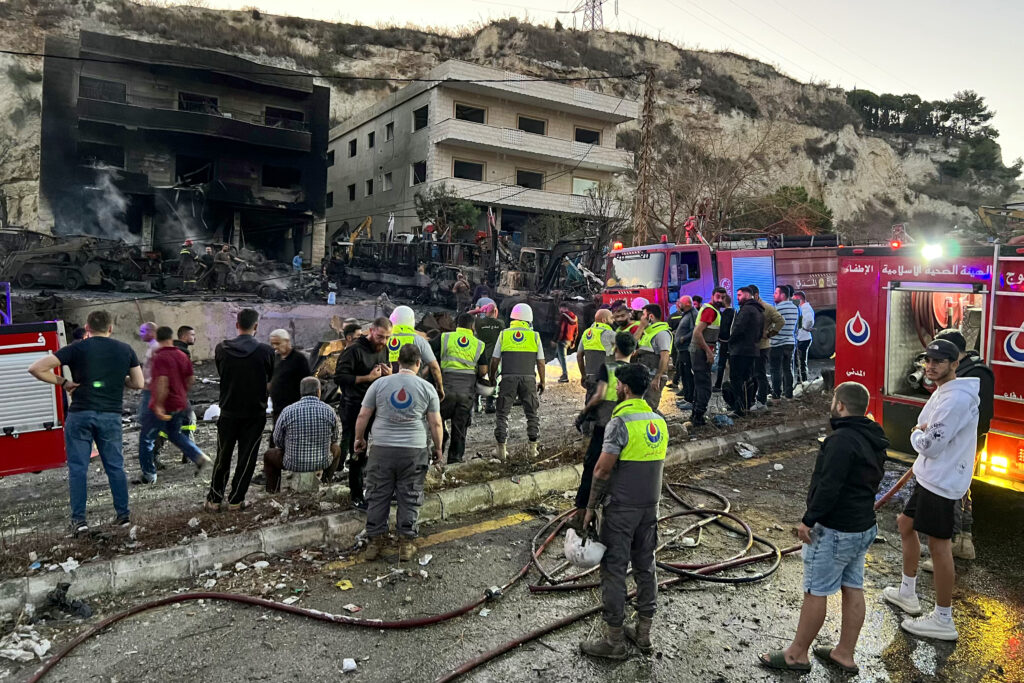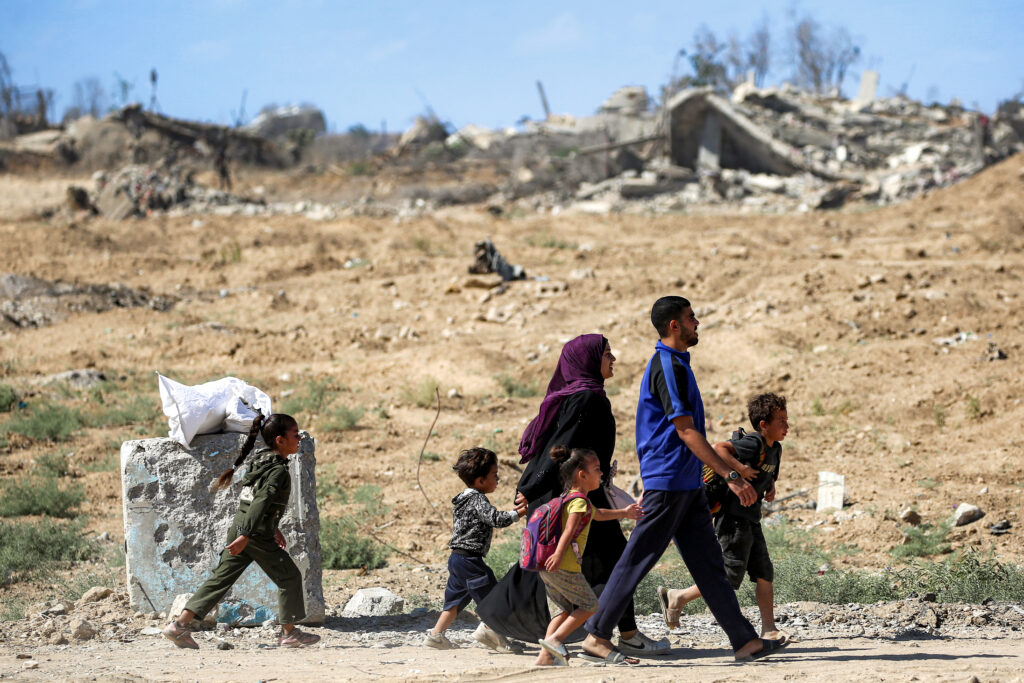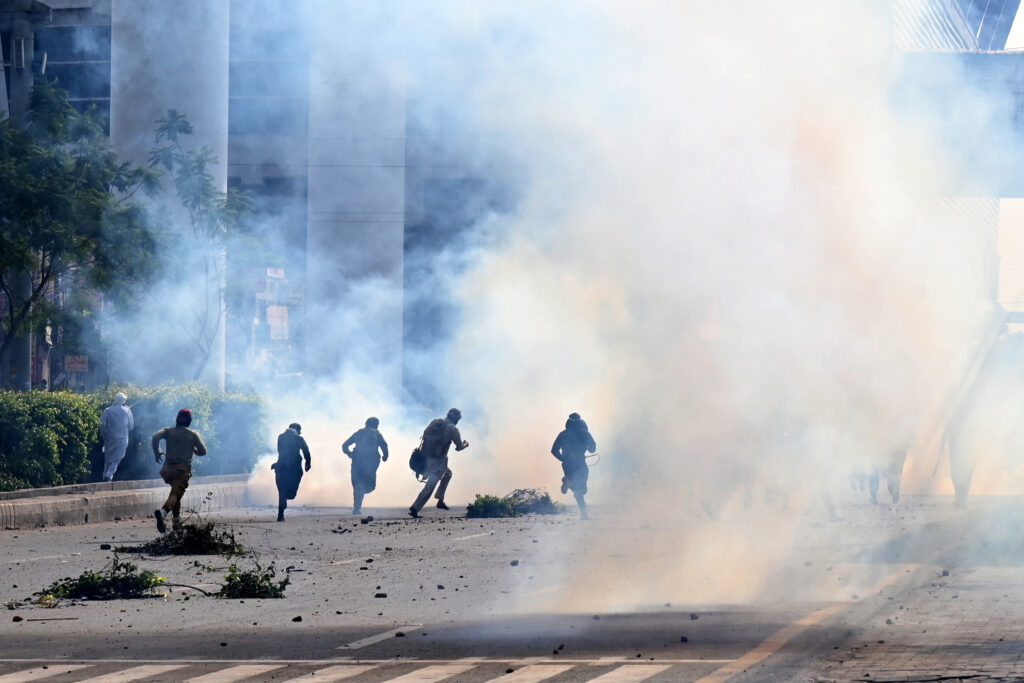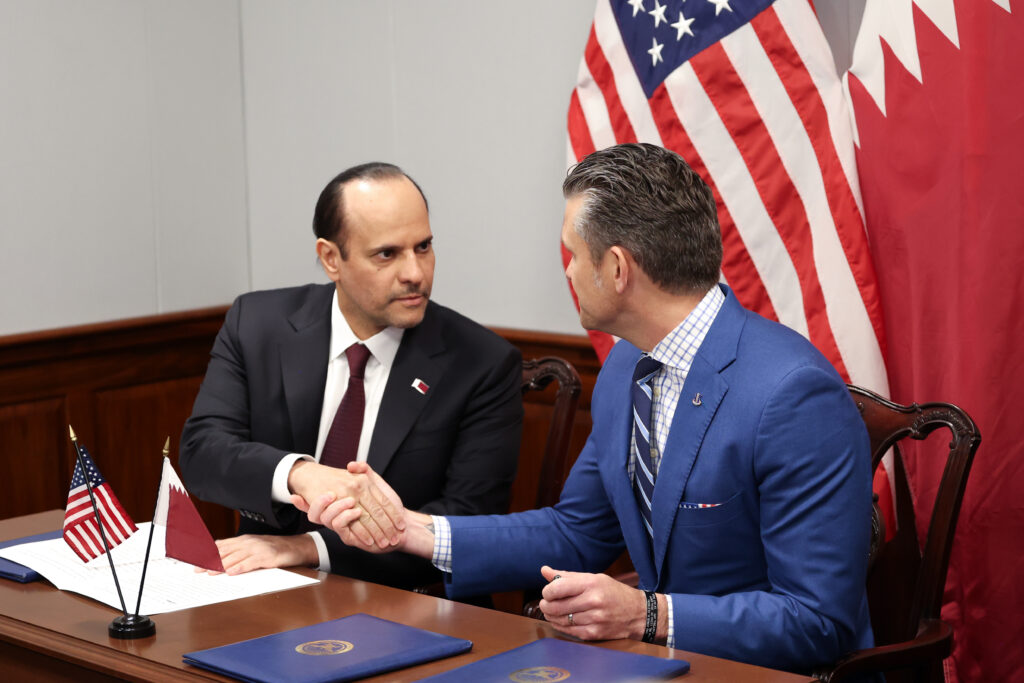AFP Asia Business
Lebanon slams deadly overnight Israeli strike
Lebanese President Joseph Aoun on Saturday condemned an overnight Israeli strike on civilian sites, which reportedly killed at least one person and which Israel said targeted Hezbollah infrastructure.”Once again, southern Lebanon has been the target of a heinous Israeli aggression against civilian installations — without justification or pretext,” Aoun said. “The seriousness of this latest attack lies in the fact that it comes after the ceasefire agreement in Gaza,” he added, questioning whether Israel now sought to expand its attacks on Lebanon.The health ministry said one person was killed and seven wounded in the strike on the Al-Msayleh area in southern Lebanon.The Israeli military shortly thereafter said in a statement that it “struck and dismantled Hezbollah terrorist infrastructure in the area of southern Lebanon, where engineering machinery used to re-establish terrorist infrastructure in the area” was located.Later on Saturday, the Lebanese health ministry reported that another Israeli attack on a vehicle in Burj al-Qalaouiyah, also in southern Lebanon, killed one person.The Israeli military did not immediately comment on the Burj al-Qalaouiyah strike.Lebanon’s official National News Agency reported that Israeli warplanes carried out 10 raids targeting bulldozer and excavator yards in Al-Msayleh, destroying more than 300 vehicles.- ‘Deliberate targeting’ -An AFP photographer at the scene witnessed massive destruction to the showrooms, with dozens of heavy machinery vehicles burned and firefighters extinguishing the flames.”We woke up terrified by the sound of bombing,” an elderly woman who asked to remain anonymous told AFP, adding that “we saw death with our own eyes”.Al-Msayleh, located over 40 kilometres (25 miles) north of the border with Israel, is where parliament speaker and Hezbollah ally Nabih Berri’s home in southern Lebanon is located.In a statement, Hezbollah condemned the strikes, saying it was “part of the repeated and deliberate targeting of civilians and economic infrastructure, and is intended to prevent people from returning to normal life”.The group called on the Lebanese government to take a “firm” stance against these attacks.Israel has repeatedly bombed Lebanon despite a November ceasefire, which followed more than a year of hostilities with the militant group that culminated in two months of open war.Its latest attack comes a day after a ceasefire took effect between Hamas and Israel in the Gaza Strip.In Lebanon there are fears of intensified Israeli attacks on Hezbollah, which has thus far resisted pressure to surrender its weapons to the state.In October 2023, Hezbollah began launching rockets at Israel in support of Hamas in the Gaza war. Months of exchanges escalated into all-out war in September 2024, before a ceasefire was agreed two months later.
Lebanon slams overnight Israeli strikes that killed one
Lebanese President Joseph Aoun on Saturday condemned overnight Israeli strikes on civilian sites, which reportedly killed at least one person and which Israel said targeted Hezbollah infrastructure.”Once again, southern Lebanon has been the target of a heinous Israeli aggression against civilian installations — without justification or pretext,” Aoun said. “The seriousness of this latest attack lies in the fact that it comes after the ceasefire agreement in Gaza,” he added, questioning whether Israel now sought to expand its attacks on Lebanon.The health ministry said one person was killed and seven wounded in the strike on the Al-Msayleh area.The Israeli army said in a statement that it “struck and dismantled Hezbollah terrorist infrastructure in the area of southern Lebanon, where engineering machinery used to re-establish terrorist infrastructure in the area” was located.The official National News Agency reported that Israeli warplanes carried out 10 raids targeting bulldozer and excavator yards, destroying more than 300 vehicles.An AFP photographer at the scene witnessed massive destruction to the showrooms, with dozens of heavy machinery vehicles burned and firefighters extinguishing the flames.”We woke up terrified by the sound of bombing,” an elderly woman who asked to remain anonymous told AFP, adding that “we saw death with our own eyes”.Al-Msayleh, located over 40 kilometres (25 miles) north of the border with Israel, is where parliament speaker and Hezbollah ally Nabih Berri’s home in southern Lebanon is located.Later on Saturday, the NNA reported another Israeli attack on a vehicle in Qalaouiyah, southern Lebanon.- ‘Deliberate targeting’ -In a statement, Hezbollah condemned the strikes, saying it was “part of the repeated and deliberate targeting of civilians and economic infrastructure, and is intended to prevent people from returning to normal life”.The group called on the Lebanese government to take a “firm” stance against these attacks.Israel has repeatedly bombed Lebanon despite a November ceasefire, which followed more than a year of hostilities with the militant group that culminated in two months of open war.Its latest attack comes a day after a ceasefire took effect between Hamas and Israel in the Gaza Strip.In Lebanon there are fears of intensified Israeli attacks on Hezbollah, which has thus far resisted pressure to surrender its weapons to the state.In October 2023, Hezbollah began launching rockets at Israel in support of Hamas in the Gaza war. Months of exchanges escalated into all-out war in September 2024, before a ceasefire was agreed two months later.
Aid groups seize on truce to tackle Gaza hunger
International agencies were preparing Saturday to pour aid into Gaza, hopeful a ceasefire between Israel and Hamas will allow them to put an end to the famine haunting parts of the territory.But optimism was marked with caution.The fragile truce could open access, but aid agencies fear Israel may continue to impose restrictions on access under US President Donald Trump’s plan.Logistical hurdles are far from the mind of displaced father Marwan al-Madhun. The 34-year-old just wants to know when the trucks will arrive.”My children are mainly happy to know that meat and chicken will arrive at last,” he told AFP in central Gaza, as tens of thousands of Palestinians started to walk back to homes destroyed during fighting in the north.”It’s been two years that they’ve been deprived,” he said. “At last, the crossing points will open!”- Famine declared -On August 22, the United Nations declared a famine in Gaza, the first in the Middle East, after experts warned 500,000 people faced a “catastrophic” threat.Israel has accused Hamas of manufacturing a crisis and stealing aid.Now, the United Nations Office for Humanitarian Affairs says Israel has approved delivery of 170,000 tonnes of aid under a response plan for the first 60 days of truce.”The most basic necessities are still urgently needed in Gaza: medical equipment, medicines, food, water, fuel, and adequate shelter for two million people who will face the approaching winter without a roof over their heads.” said Jacob Granger, Gaza coordinator for Doctors Without Borders.Representatives of Granger’s organisation, the World Food Programme and the Norwegian Refugee Council (NRC) said they were ready to step up shipments, but much remains unclear.”The difficulty we have now is questions of access,” said Antoine Renard, WFP director in the Palestinian territories, speaking from Deir el-Balah in central Gaza.The WFP, which leads the group of organisations handling food security, has begun discussions with COGAT, the Israeli defence ministry agency for civilian affairs in the territories.On Friday, empty WFP trucks were seen leaving Khan Yunis in southern Gaza and heading to the Kerem Shalom crossing to be loaded with food aid for distribution inside Gaza.The Trump plan foresees a return to the UN-led aid system in place before January 2025, when Israel sealed Gaza’s borders and a private US-led operation took over aid distribution.”But the conditions on the ground are different,” Renard said.Since Israel’s latest offensive into the cities in the north of Gaza last month, hundreds of thousands of Palestinians have been driven from the homes — many of which were destroyed — into central and southern Gaza.This has shifted pressure for food aid into a now overcrowded area whose original residents were already struggling.The Trump plan states “full aid will be immediately sent to the Gaza Strip” as soon as the agreement comes into effect, “without interference from either party.”Several humanitarian sources expressed optimism, despite concerns about security and registration procedures, on which Israel has yet to provide guidance.- ‘Bargaining chip’ -“We are pushing different embassies and donors to speak to the Israeli authorities on their end, because we need, for example, trucks that can make round trips to the distribution platforms without facing constraints on the Israeli side,” an official from a medical agency told AFP.Since spring, most of the aid on which Palestinian civilians depend has been supplied by the private Gaza Humanitarian Foundation.The UN Human Rights Office says GHF operations — supported by the United States and Israel — have seen 1,000 people killed near distribution sites.Several aid officials told AFP they were not involved in planning for the ceasefire.”We don’t have a lot of visibility on what exactly has been agreed on yet, but we will do everything we can,” said Shaina Low, NRC spokeswoman.”Humanitarian aid should never be subject to negotiation — it’s a fundamental right for people in need,” she argued.”The fact that it’s tied to a ceasefire deal is problematic, as it should not be used as a bargaining chip — just as the hostages never should have been.”
Pakistan Islamists march towards capital after violent anti-Israel protests
Several thousand members of a hard-right Pakistan Islamist party began marching towards the capital on Saturday, after violent clashes with police during anti-Israel protests in the eastern city of Lahore.Tehreek-e-Labbaik Pakistan (TLP) began its protests in Lahore on Thursday and announced plans to march to the US embassy in Islamabad to voice its opposition to the US-brokered ceasefire between Israel and Hamas after two years of war in Gaza.The demonstrations turned violent on Friday, with police launching baton charges and firing tear gas at protesters who had pelted them with rocks, AFP journalists saw.Traffic was disrupted in Lahore and in Islamabad, about 370 kilometres (230 miles) to the north, with authorities also suspending mobile internet connections and closing major roads.Shipping containers were being placed as barriers across major roads in the capital in anticipation of the arrival of the protesters.As many as 50 police officers were injured in Friday’s clashes, a senior police official told AFP, while TLP claims that some of its members had been killed could not be verified independently.The TLP said the protests had originally been organised to oppose the Gaza ceasefire deal between Israel and Hamas, which Pakistan backed, but was now intended to express solidarity with Palestinians.”We have no demands, apart from showing solidarity with the people of Gaza,” senior TLP member Allama Muhammad Irfan told AFP as the protesters set off for Islamabad.”We have no idea when we will reach Islamabad, but the government is being brutal with us. We are not negotiating with the government at all,” Irfan said.Deputy Interior Minister Tallal Chaudry vowed on Thursday not to let the protesters enter Islamabad.”There is no room for any radical activity in Islamabad,” he told reporters.”Why is an agreement that is acceptable to Hamas and Palestine not acceptable to you?”.Israel declared a ceasefire and began pulling back its troops at around noon on Friday, as tens of thousands of Palestinians began walking back towards their devastated homes.Prime Minister Shehbaz Sharif hailed the deal on Thursday as a “historic opportunity to secure lasting peace”.”We will continue to work with partners, friends and the leaders of brotherly nations to ensure that peace, security and dignity for the Palestinian people are established,” he said.The TLP has been behind some of Pakistan’s most violent protests, and frequently calls on the government to expel Western ambassadors.Pakistan has no formal diplomatic relations with Israel.
US announces deal for Qatar air force facility in Idaho
US Defense Secretary Pete Hegseth announced Friday that Qatar will be allowed to build an air force facility at Mountain Home Air Base in Idaho that will house F-15 fighter jets and pilots.The announcement comes soon after President Donald Trump signed an executive order vowing to defend the Gulf Arab state against attacks, following Israeli air strikes targeting Hamas leaders in the Qatari capital Doha.”We’re signing a letter of acceptance to build a Qatari Emiri Air Force facility at the Mountain Home Air Base in Idaho,” Hegseth said at the Pentagon, with Qatari Defense Minister Sheikh Saoud bin Abdulrahman Al-Thani at his side.”The location will host a contingent of Qatari F-15s and pilots to enhance our combined training” as well as “increase lethality, interoperability,” he said.”It’s just another example of our partnership. And I hope you know, your excellency, that you can count on us.”The Idaho base currently also hosts a fighter jet squadron from Singapore, according to its website.Hegseth also thanked Qatar for its “substantial role” as a mediator in the talks that led to a truce and hostage-prisoner swap deal between Israel and Hamas, and its assistance in securing the release of a US citizen from Afghanistan.The Qatari minister hailed the “strong, enduring partnership” and “deep defense relationship” shared by the two countries. The Al Udeid Air Base in Qatar is Washington’s largest military facility in the Middle East.Trump’s close relationship with the leaders of Qatar has raised eyebrows, especially over its gift to the US president of a Boeing 747 to be used as Air Force One.Though the Idaho facility for Qatar had apparently been in the works since the last administration of Democrat Joe Biden, the deal prompted some hand-wringing on social media, including from far-right activist Laura Loomer, usually a Trump ally.”Never thought I’d see Republicans give terror financing Muslims from Qatar a MILITARY BASE on US soil so they can murder Americans,” Loomer wrote on X.Hegseth, who never said it was a base, later wrote on the platform: “Qatar will not have their own base in the United States — nor anything like a base. We control the existing base, like we do with all partners.”




